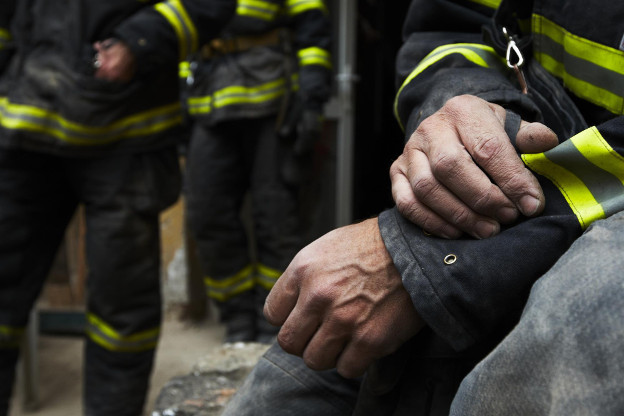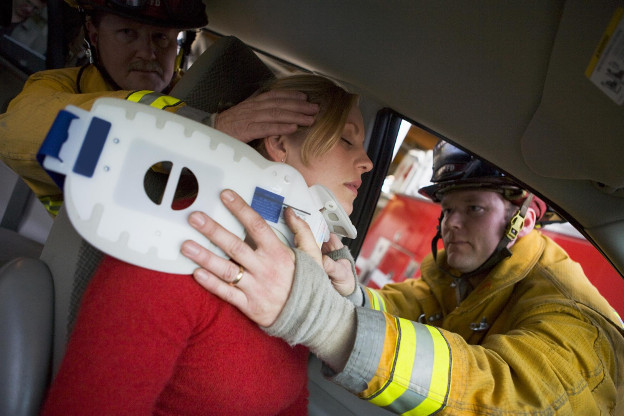AFTER THE DISASTER: POST-TRAUMATIC STRESS DISORDER IN FIRST RESPONDERS
From the merciless hurricanes that tore through Texas and Puerto Rico to the raging wildfire that became the largest in California’s history and led to devastating mudslides, 2017 was an exceptional year for natural disasters in the U.S . In fact, it was the costliest on record.1
The physical and mental health toll on civilian victims of natural disasters receives a good deal of attention from the media and public health officials, and rightfully so. What about the first responders-the men and women who put their lives on the line during and after disasters and every day in the line of duty as firefighters, police, and EMTs?
These unsung heroes routinely come to our rescue and make our world safer, yet, behind the scenes, they’re hurting.

A mental health survey of first responders conducted by the University of Phoenix found that:
- 85% of first responders have experienced symptoms related to mental health issues.
- 34% have been formally diagnosed with a mental health disorder.
- Of the 27% of respondents who have been diagnosed with depression, nearly half (47%) cited incidents at work as the cause of their depression.
1 IN 10 FIRST RESPONDERS SUFFERS FROM PTSD
PTSD is also a significant issue facing first responders. Ten percent of respondents to the University of Phoenix survey said they have been formally diagnosed with post-traumatic stress disorder (PTSD).2
While three-quarters of survey respondents with PTSD said they have received treatment, 25% have not sought or received treatment, and many reported facing mental health stigma at work.
Let’s look at PTSD in more detail-what it is, its causes and risk factors, and why it’s so important for first responders to seek treatment. We’ll also explore how healthcare treatment facilities can incorporate medical healthcare videos covering mental health topics into their training programs to help healthcare personnel recognize the signs of PTSD.
WHAT IS PTSD?
PTSD is a mental health condition characterized by flashbacks, nightmares, severe anxiety, and uncontrollable thoughts about a traumatizing event.
First responders face stressful events, danger, and uncertainty every day. They often witness gruesome scenes at the site of an accident or disaster. As a matter of course, they come to the rescue of severely maimed/injured individuals, sexual assault survivors, burn victims, and others who have suffered major trauma, and they may encounter corpses in the line of duty.

First responders may also find themselves in harm’s way during a natural disaster, terrorist attack, domestic dispute, or another dramatic event. Over time, these repeated exposures can take their toll.
SYMPTOMS OF PTSD
PTSD symptoms can start shortly after a traumatic event or, in some cases, not until years later. Symptoms of PTSD can interfere with relationships and impair a person’s ability to work and perform day-to-day tasks.

PTSD symptoms are grouped into four types:
- Intrusive memories : Recurrent, upsetting memories of the event; reliving the event; nightmares; emotional distress in response to reminders of the event.
- Avoidance : Avoiding people, places, or activities that are reminders of the event; avoiding thinking or talking about the traumatic event.
- Negative changes in thinking and mood : Feeling emotionally numb or hopeless about the future; feeling detached from family and friends; difficulty maintaining close relationships; memory problems (esp. forgetting details of the event); suicidal thoughts.
- Changes in physical and emotional reactions : Being easily startled or frightened; constantly being on guard; trouble sleeping; difficulty concentrating; irritability; angry outbursts or aggressive behavior; overwhelming feelings of guilt and shame; self-destructive behavior (e.g., drinking too much or abusing drugs).
CAUSES OF PTSD
First responders routinely deal with stress and danger in the course of their work, so why do only some develop PTSD? Medical professionals believe a complex mix of factors, including a person’s temperament, their inherited health risks (e.g., a history of depression and anxiety), the way a person’s brain handles stress, and the severity of the trauma can all play a role in whether a person develops PTSD.
Co-occurring mental health problems, a family history of mental health problems, long-lasting trauma, the lack of a strong social support network, and early life trauma are all risk factors that can make a person more likely to develop PTSD.
BREAKING THROUGH THE STIGMA
Fear of stigma and negative repercussions are still major barriers to care for first responders with PTSD and other mental health issues. This is reflected in the findings from the University of Phoenix survey: 2
- 39% percent of respondents said they would face negative repercussions for seeking mental health at work.
- 55% said their supervisor would treat them differently if they brought up mental health concerns at work.
- 45% said their co-workers would perceive them as “weak” if they brought up mental health concerns at work.
- 39% said bringing up mental health issues at work would make them lose out on promotions.
It’s clear more work needs to be done in stamping out the stigma surrounding mental health issues like PTSD and breaking down barriers to mental health care.
THE INCREASING IMPORTANCE OF FIRST RESPONDERS IN A CHANGING WORLD
Accidents and disasters have always been a part of the human experience and will continue to strike without warning. In fact, the frequency of natural disasters and conflict may actually increase. According to scientists, natural disasters will become more frequent and more intense as the planet continues to warm from climate change.3,4 A recent study even found that warming temperatures around the world not only puts our physical health at risk but may also increase suicide rates.5
As conditions continue to change on the planet, the role of first responders will become even more critical. Ensuring these important public health ambassadors have access to mental health care is essential.
THE ROLE OF HEALTHCARE WORKERS
Mental health professionals, nurses, and doctors play an important role in ensuring first responders get the care they need. Healthcare professionals must be able to recognize the signs and symptoms of PTSD to effectively help first responders suffering from this often-debilitating condition. Medcom’s programs can help.

MEDCOM’S FEATURED SERIES: MENTAL HEALTH ASSESSMENT TOOLS
For professionals aiding people with mental health disorders, assessing the person’s symptoms is the first step toward making a diagnosis and developing an appropriate treatment plan.
Medcom’s Mental Health Assessment Tools medicalMental Health Assessment Tools video series was designed specifically for mental health professionals working in the fields of psychology, psychiatry, social work, counseling, nursing, first response, and the military. The dynamic collection of visual guideposts contains 40 real-life-based DVDs that help viewers understand and recognize psychiatric disorders.
Viewers learn to identify non-verbal cues and body language identifiers across a broad spectrum of disorders, including:
- Alcoholism and CAGE Assessment
- Anger AssessmentDisorders
- Anxiety Assessment
- Eating Disorders
- Gun Safety Assessment
- Mental Status Exam
- Coping Mechanisms and Defenses
- Loss and Grief AssessmentDisorders
- Suicide Assessment
- Trauma and PTSD Assessment
- Violent Disorders
The collection seamlessly integrates into your current mental health training program and will undoubtedly prove to be a valuable addition. For more information about this series or to set up a free preview, please contact Medcom at 800-541-0253, or email [email protected].
ABOUT MEDCOM
For over 50 years, Medcom has been a trusted education provider among healthcare professionals, students, patients, and their loved ones. Our vast library of products is used nationwide by universities, hospitals, long-term care facilities, and mental/behavior health areas.
Medcom offers a complete suite of online healthcare education , including nursing CE programs, to help ensure quality care. Our award-winningthat products not only meet regulatory compliance, but the Medcom solution is cost-effective, meets in-service and continuing education needs, and boosts employee retention. To ensure the highest level of quality, we have worked with leading healthcare and professional organizations, such as the American Lung Association, John Hopkins Hospital, and Mayo Clinic. Learn more on our website.
Sources:
- https://www.vox.com/energy-and-environment/2017/12/28/16795490/natural-disasters-2017-hurricanes-wildfires-heat-climate-change-cost-deaths
- https://www.phoenix.edu/about_us/media-center/news/uopx-releases-first-responder-mental-health-survey-results.html
- https://www.scientificamerican.com/article/new-data-hurricanes-will-get-worse/
- http://www.phi.org/news-events/1339/climate-change-is-making-natural-disasters-worse-and-more-likely-how-do-we-protect-the-most-vulnerable
- https://www.nature.com/articles/s41558-018-0222-x
